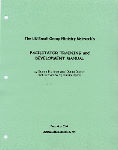I was one of the first group of church members to be trained as Branches (small group) facilitators. Our minister, Rev. Steve Crump, did a wonderful job of giving us a model of what the groups should look like, and more importantly, what they should feel like. Even so, interacting with humans, on this level, in real time, there is no training for that. Mark Gilbert, co-facilitator, and I had the luck or bad luck, however you look at it, of forming a group that decided, right out of the chute, to fly without a net, as someone put it. In other words, they wanted to be a covenant group without a covenant. No matter how much Mark and I pushed and prodded, they were not going to have it. They wanted their bond as a group to stand alone, with no strings attached. To make matters worse, we seemed to attract new people into the group that were just as rebellious. While Mark and I commiserated over it, Steve said that indeed a covenant had been made. It was an unspoken one.
That was nine years ago. The membership has ebbed and flowed for different reasons, mainly members moving away. Still, we have retained a core group of dedicated members.
At our last meeting we were discussing "transformation" from a series on Process Theology. It was about how being accepted by or accepting someone or a group can be transformative. Each member expressed in some way what the group has meant to them, new and old members alike. We have seen each other through good times and bad. Some mentioned what a boost it has been to their spiritual growth to be a part of and have the support of such an open and accepting group. Others talked about the transforming power of a phone call, a card, a face at the hospital, prepared food after surgery, or checking on each other after a hurricane. Some said this was the best or smartest thing the church could have come up with. Others said it is the thing that keeps them connected to the church.
I add my voice to the transforming power of being a witness to, as well as a part of this process of small group ministry. We provide a safe space, once a month, for two hours where we can count on being heard and not judged. We are not there to fix, but if we can help, we do. It has been amazing to me to be a part of this group that has bonded without a written covenant and flies without a net. We do it, I'd guess, by holding each other's hand.












 HEART TO HEART: Fifteen Gatherings for Reflection and Sharing
HEART TO HEART: Fifteen Gatherings for Reflection and Sharing